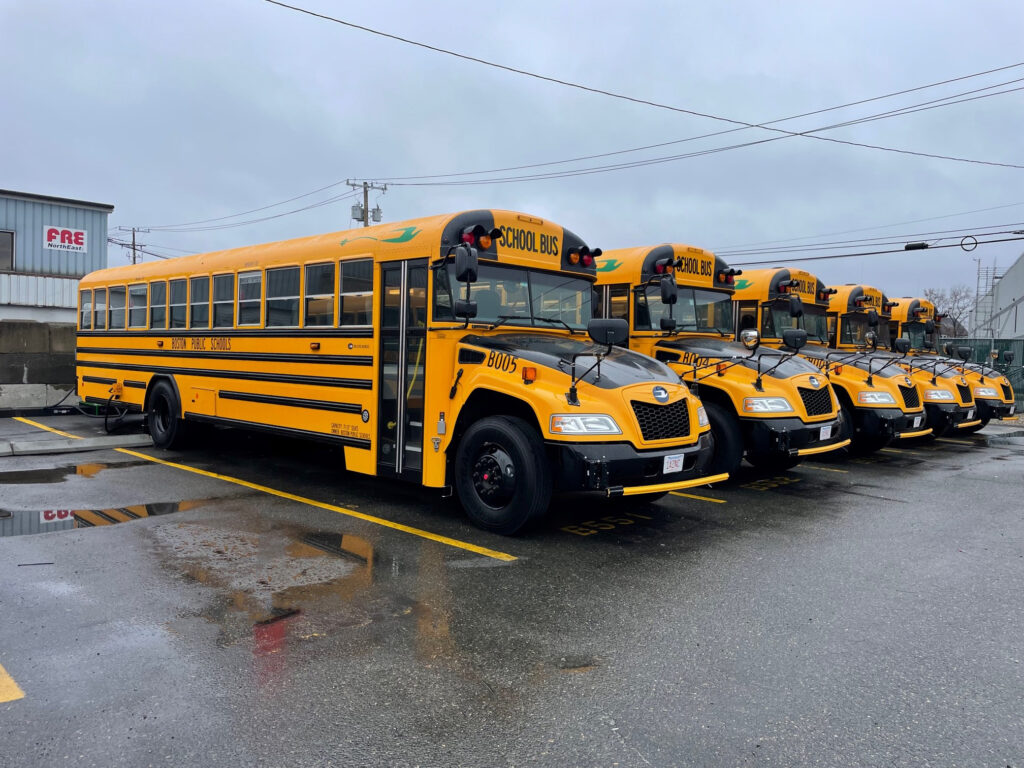by Ian Elder, National Research and Policy Manager
Electric school buses (ESB) have come a long way since a year ago, when we published our comprehensive report, Driving the Future. In just a year, the technology has taken off: since last spring, the number of ESBs funded, ordered or deployed in the U.S. has doubled, an expansion largely underwritten by the U.S. Environmental Protection Agency’s (EPA’s) initial $1 billion investment from the Clean School Bus Program. Such rapid progress on putting clean buses on the road owes in no small part to the unflagging advocacy of the Alliance for Electric School Buses—of which Jobs to Move America is proud to be a member.
The EPA’s investment presented a rare opportunity to rebuild a skilled manufacturing workforce decimated by decades of unfair trade agreements and union busting. Growing a high-road manufacturing sector has been an explicit goal of the Biden administration’s industrial policy. Yet the initial school bus rebate program included few provisions to strengthen the school bus workforce. In response, JMA and our allies in the labor and environmental movements worked to make the case for more worker-friendly language in subsequent funding rounds.

At the end of April, the EPA announced the opening of its 2023 grants program, which included some of the major labor policies we were advocating for, such as workforce impact assessments to ensure school bus mechanics receive the training they need to maintain and repair electric buses, and a requirement for electricians to be certified under the Electric Vehicle Infrastructure Training Program. Both of these provisions benefit workers, and at the same time will ease the adoption of electric buses by making sure workers have the skills they need to deploy the buses and keep them running.
The agency also released an inquiry to school bus manufacturers, asking them to report on the quality of jobs at their factories, which should help create transparency and accountability around job quality at school bus factories. While all of these measures represent progress, we are urging EPA to adopt stronger measures for future rounds of funding.
Meanwhile, school bus manufacturing workers are no longer accepting disrespect, unsafe conditions, and low pay in the face of massive corporate profits. Workers at the Blue Bird production facility in Macon, Georgia, have been organizing for years, and in May, filed for an NLRB election to join the United Steelworkers. Blue Bird is one of the three large, established school bus manufacturers, and like United Auto Workers-represented IC Bus and Thomas Built Buses, has begun to make the switch to electric school buses. (Last year, we took the train to High Point, North Carolina, to talk with four Thomas Built workers, including Willie Walker and Tanya Brown, who shared their experience building electric buses in a union factory.)
In spite of alleged illegal and immoral intimidation tactics by Blue Bird, including threats to close the facility, the workers were victorious in winning union recognition on May 12. This achievement is stunning given the context: a big Southern automotive factory with 1,400 production workers unionizing is a testament to skilled organizing and rising solidarity nationwide. Blue Bird workers are now negotiating their first contract.
Now that school bus production workers in Georgia have won their union, the only major non-union manufacturer of standard-size (Type C) school buses is Lion Electric. Last summer, JMA and a coalition of 20 other environmental, labor, and civic groups released a letter to the company urging them to negotiate a community benefits agreement (CBA). So far, Lion has refused to discuss a CBA. On July 21, Lion Electric will be hosting an official ribbon-cutting for its Joliet, IL factory—and the community, environmental movement and workers are still waiting.
As the U.S. begins to rapidly switch over its 500,000-strong school bus fleet to all-electric, we’re excited to keep organizing for a transition with workers and communities in the driver’s seat.
